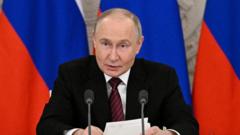Ukraine and Russia have entered into a limited cease-fire agreement to end maritime hostilities in the Black Sea, following three days of discussions in Saudi Arabia. However, key concessions from Russia are absent, and further negotiations are needed to ensure compliance and details regarding energy facilities.
Ukraine and Russia Reach Limited Cease-Fire Agreement in the Black Sea

Ukraine and Russia Reach Limited Cease-Fire Agreement in the Black Sea
A new agreement to halt hostilities in the Black Sea may pave the way for further negotiations, but significant challenges remain.
In a significant development, Ukraine and Russia have agreed to a partial cease-fire in the Black Sea, as announced by the White House. While this pause in maritime offensives marks an important step forward, it does not equate to a complete cessation of hostilities. The agreement was reached after three days of talks held in Saudi Arabia and includes provisions to negotiate the suspension of attacks on energy infrastructure.
Notably, the Kremlin has conditioned its compliance on the lifting of Western sanctions impacting Russian agricultural exports. The White House has indicated plans to assist in restoring Russia's access to international markets for agricultural and fertilizer products, among other actions. President Volodymyr Zelensky of Ukraine, however, criticized the provision, labeling it a "weakening of positions and sanctions."
The next steps remain uncertain, particularly in terms of the implementation timeline of this limited cease-fire and the firmness of the commitment from both sides. Ukraine's defense minister emphasized the necessity for further discussions to solidify the agreement as soon as possible.
With attacks on energy facilities being a mutual concern, the global attention is now on the effectiveness of this cease-fire and its potential to lead to a broader resolution.























